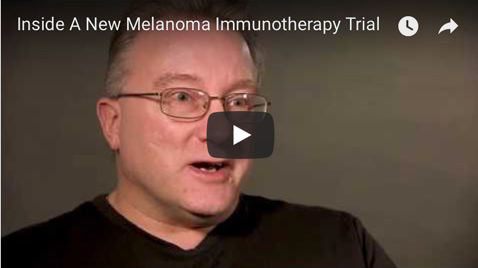Story by Maryann Brinley • Portraits by John O'Boyle View the complete magazine | Subscribe to Cancer Connection
Nick Vojnyk is enjoying life once again thanks to an immunotherapy clinical trial exploring a virus associated with the common cold.
Ever since I was a kid, for years and years and years, I had this mole on the inside of my right ankle," Nick Vojnyk explains. He's 56, a loving family man, and dreaming about retirement. He's also a patient in a remarkable melanoma immunotherapy clinical trial at Rutgers Cancer Institute of New Jersey. "About four years ago, that mole began to grow and" - like most busy working people living full lives - "by the time I went to the doctor, it had gone into a high stage of melanoma. It was scary."
Melanoma is not the most common of skin cancers but it is more likely to be fatal and Vojnyk knew it. "Yes, I Googled it," he says. Fortunately, he had his sister Charlene, who is training to become a nurse practitioner specializing in oncology, right there beside him all the way. "She came with me everywhere and would take time off from work to do this. But it is still very scary. There are a lot of decisions to be made so you start reading everything: journals, magazines like this one, going on the computer and searching YouTube…everything that will help you make those decisions but the sooner you do, the better off you are," he says. "And I've got to tell you: at Rutgers Cancer Institute, they treat you like a person, not a piece of meat. These doctors, my surgeon, the nurses and researchers - I would listen and watch their physical reactions, mannerisms, everything - and they are wonderful. They really care. They talk to you, calm you down and it's not as scary for me now, especially with this new exciting treatment."
At Rutgers Cancer Institute, under the care of medical oncologist Janice Mehnert, MD, who is the director of the Phase I/Investigational Therapeutics Program and medical oncologist Ann Silk, MD, who is the principal investigator of this particular clinical trial, Vojnyk's spreading tumors were injected several times in an investigational therapy using a strain of the common cold virus family called coxsackievirus. The protocol also includes an intravenous drug, pembrolizumab, administered afterward to boost his immune system. He's still on pembrolizumab, months into his therapy. "I call that one the sweeper drug," Vojnyk says. The doctors stopped giving him the coxsackievirus injections because the tumors that were being injected disappeared. "Every time I walk into Rutgers Cancer Institute, everyone is excited about how well the treatment is going. At my last appointment, they could find no cancer at all."
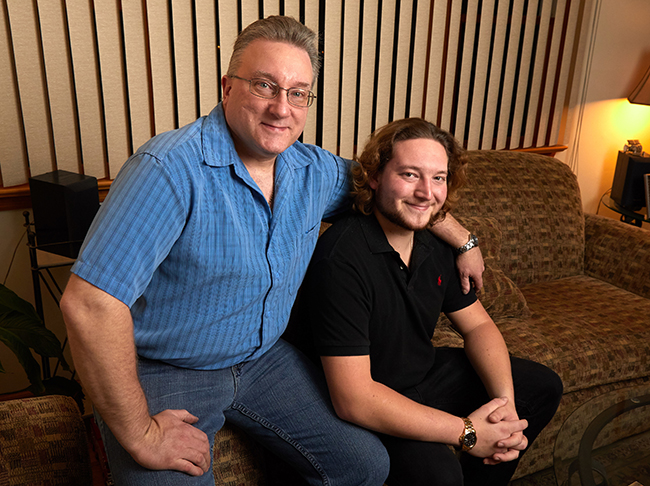
Nick Vojnyk's son Patrick (right) has been key to his recovery, taking care of his father following his initial surgery, and still keeping an eye on his dad today.
His healthcare team is also optimistic. "I hope that this research will prove that melanoma is not really a death sentence," says Dr. Mehnert, who is also an associate professor of medicine at Rutgers Robert Wood Johnson Medical School. "The word cure is not a word we historically use when talking to patients with advanced melanoma. So to be in the situation where we are now, looking at patients' scans, and wondering, maybe, just maybe, we can eradicate their disease or at least keep it at bay forever, well that's pretty exciting." Combining an oncolytic virus injection with immune therapy is not brand new, Mehnert explains. "But this trial is novel because it capitalizes on what we are learning about the immune system and the coxsackievirus as a unique agent. If manipulated the right way, it can be a very powerful tool to fight cancer. That's why this project is so timely." This is the very first time these two drugs have been combined in this approach.
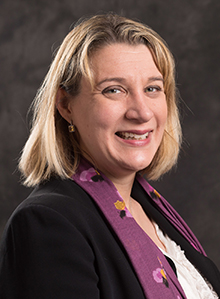
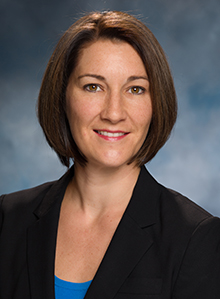
"The most rewarding part of being a cancer doctor is when I see patients who are doing well and feel like they have their old lives back," says Ann Silk, MD (bottom). Dr. Silk and Janice Mehnert, MD, (top) are part of Nick Vojnyk's care team at Rutgers Cancer Institute. (Photo of Dr. Silk: Steve Hockstein)
Vojnyk is one of the first group of 25 patients to be enrolled, a process that started in December 2015, and the goal is to include 25 more patients over the next year, according to Dr. Silk, who is also an assistant professor of medicine at Rutgers Robert Wood Johnson Medical School. "When we inject live virus, this gets the attention of the immune system. We inject the tumor with this live virus to generate an immune response and then we give the immune checkpoint antibody (pembrolizumab) to keep the immune response going," Silk says. In other words, they are turning a patient's tumor into what she calls a "personalized cancer vaccination." Silk and her team draw tumor and blood samples. They hope to identify predictors that would indicate which patients will have a better outcome. "On a routine basis, we are also collecting the patients' antibodies to the virus and the number of virus parts in the blood. Knowing that interim immune response may help predict if the patient's tumor will respond well to treatment or not."
Mehnert likes to use the analogy that "when you are a cancer researcher, you start every day by pushing a boulder up a hill. If you get 25 percent of the way up the hill, that's a really good day. Most days," she admits, "you get 5 percent up the hill." Part of her dedication to this field of medicine and research is personal. "When I was in medical school, I lost my uncle to advanced lung cancer. I was always attracted to oncology but that was a really motivating factor not only to go into oncology but to pursue research." What she loves is to be able to look advanced cancer patients in the eye and offer them something they can't get anywhere else, as part of a clinical trial. She does this a lot. "As a clinical researcher, patients are often referred to me when their cancer is advanced and they have no additional options. They come from far and wide." She is seeing more self-referrals in fact, where "patients find us. We are putting trials on social media and the Internet. Previously, I might just get a call from a local physician. It is so important for us to get the word out about what we are doing."
According to Silk, Rutgers Cancer Institute has an excellent portfolio of trials open for patients. "Sometimes people hear the words clinical trial and automatically shut down because they are afraid. I tell them that most of our trials include standard of care medicine and that in a clinical trial we are just adding something extra to help the therapy work better." The very best treatment is what the team at Rutgers Cancer Institute wants for every patient. Yet, "old biases against participating in clinical trials can run deep," Silk admits, which is why she depends upon gaining her patients trust. "Oncology is very special because cancer is a serious disease where you have to build that trust to be able to move forward. The list of side effects can sometimes be scary and the patient has to believe that you are going to see them through it." She feels passionately about what she does. "A cancer diagnosis changes everything. So many times my patients want to know if they will be okay or if things will ever be the same again. Sometimes the answer is, 'Yes.' The most rewarding part of being a cancer doctor is when I see patients who are doing well and feel like they have their old lives back."
Nick Vojnyk is that kind of patient. After his initial diagnosis of melanoma more than four years ago, he underwent treatment in another clinical trial of interferon under Mehnert's care. "I had to go into the hospital five days a week for four weeks." Once a machine tool and die maker, he counts himself lucky that his job at the time as a mechanical electrical troubleshooter for a large corporation was just a few minutes away. "Yes, I kept working and it certainly wasn't a desk job. It kept me going but I will tell you upfront, it was like having the flu every day. That's what it felt like. You'd get fevers, chills and just feel awful." In spite of that, he was up every morning at 6:00 to start all over again. "Dr. Mehnert and everyone at Rutgers Cancer Institute couldn't believe I worked through it all, didn't miss a day." Then, the cancer returned.
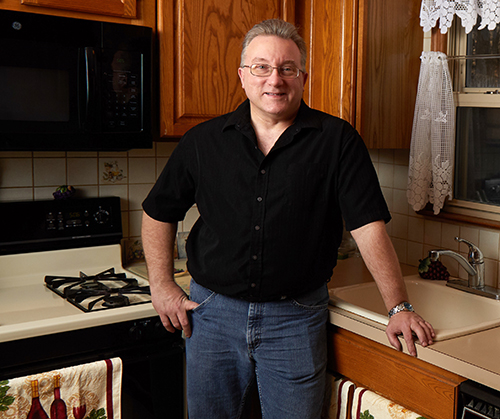
"I've got to tell you: at Rutgers Cancer Institute, they treat you like a person," says Nick Vojnyk. "These doctors, my surgeon, the nurses and researchers...are wonderful. They really care."
Quality of life during a clinical trial is "a no brainer," insists Mehnert. "What good is it to design a clinical trial that cures cancer but the side effects aren't acceptable to patients and the financial costs make the therapy out of reach for most?" For Mehnert and her team, "The Holy Grail is moving into situations where the side effects aren't so bad and the drugs are really effective. We are just starting to get there with immunotherapy and it's really exciting." This is what they offered to Vojnyk on his second journey with cancer.
Unlike his experience with interferon, Vojnyk has virtually no side effects or symptoms at all with his current treatment. "It's like a walk in the park. I'm eating normally, not getting any fevers or chills and still working," he laughs. When asked if she has had any "eureka" moments in her cancer research, Mehnert goes right to Nick Vojnyk. "Seeing Mr. Vojnyk's images was an amazing moment." The magnitude of his response to this immunotherapy, confirmed in a biopsy, was "truly exciting," she says. "We could not find any active tumor. To see this in a patient who has been in my care for years and is now in his second clinical trial with us is so rewarding."
Still working full time, Vojnyk is dreaming of retirement. His alarm goes off every morning at 3:15. "We start early," he laments. He wants to follow his older brother Cal, who has retired to Florida, and play lots of golf, "though I'm just a duffer." In fact, it was playing regularly with a group of friends and co-workers that helped him emotionally. "We'd meet after work on Mondays at 4:15. It was just great. A bad day at golf is better than a good day at work," he laughs, "…even on days I had my treatment. Just being out there with these guys, talking and playing golf made going through all this stuff easier." He credits his girlfriend, Sonia, and everyone in his family, not just his sister Charlene, but his sisters Virginia and Lisa, for getting him through. But his adult son Patrick has been key to his recovery. For the seven weeks following his initial surgery to remove that first tumor, Patrick moved back in to take care of his father. It wasn't easy. "I had to keep my leg up for the entire time so he stayed here with me." Meanwhile, Patrick recently completed a Master's degree in Marine Biology at Montclair State University and is out there hunting for the perfect job, but he still keeps an eye on dad.
Nick Vojnyk is always willing to tell his melanoma story. "Having cancer is always going to be nerve-wracking. You get a pain and think: 'Oh my God, what is this?' But when you are being watched and treated by the kind of team I have at Rutgers Cancer Institute, it calms you down. I am so excited to share this story, especially if it helps someone else. What comes out of my mouth is what my heart says." ■


